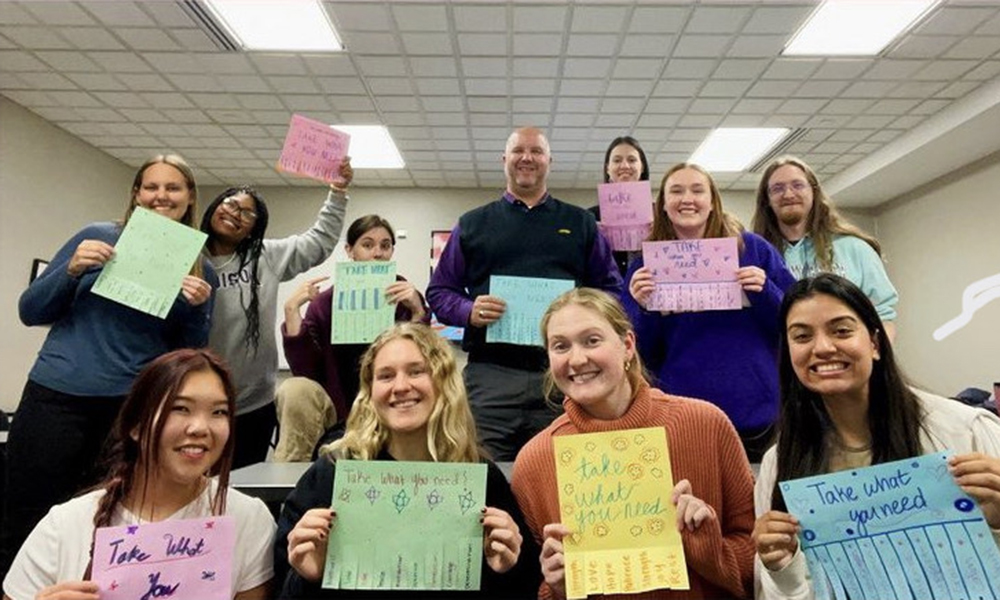FOR JMU club promotes kindness across campus
News
The Friends of Rachel (FOR) Club at JMU promotes kindness as a means to support others on campus and foster wellbeing among members. Jennifer Haller, a fourth-year Health Science major, and Adiba Khaydari, a third-year Psychology major, are on the executive team for the club and encourage students at JMU to get involved in FOR JMU.
Many club members and those in club leadership are CHBS majors, but students of all majors are welcome to participate in the club. Random acts of kindness are planned and organized at club meetings, and with no dues or attendance requirements for the club, it’s easy to spread kindness around campus with FOR JMU.
Friends of Rachel clubs are established to sustain kindness initiatives in schools and other organizations. The club is named after Rachel Scott, who was a student at Columbine High School. In 1999, Columbine was the site of a major school shooting in which 15 people were killed. The tragedy brought national attention to issues like gun regulation and bullying.
“She was shot and killed in the shooting. She kept these journals, and in it she’d write about kindness and how a little act of kindness can go a long way. After she died and her parents found those, and they thought they should do something,” Haller said.
The family of Rachel Scott founded Rachel’s Challenge which addresses “the root causes of school violence, bullying, prejudice, and self-harm through student wellness programs that build connection, hope and resilience,” according to their website.
“We start off with doing a Friends of Rachel kindness chain,” Khaydari said, about the bi-weekly club meetings. To make the kindness chain, members of the club share about acts of kindness they’ve done or seen lately. Each instance of kindness is symbolized by adding a loop to a paper chain.
Though activities vary at each meeting, the club often writes notes or packages goody bags to give out on campus to show kindness and foster a welcoming community at JMU. Recent acts of kindness include writing notes of appreciation to dining hall staff and making goody bags for Valentine’s Day.
“It’s healing, in a way,” Haller said. “When it’s been long, hard day, then I go there and I’m able to do something for someone else, it makes them feel good and it makes me feel good.”
“Seeing the sticky notes or getting the goody bags, it reminds people that there’s other people who care about them,” Khaydari said. “And that we’re all here for one another.”
“When we give out goody bags, there’s usually an immediate reaction,” Khaydari said. “We usually do those around midterms or finals week. You can tell that they’re really happy.”
Along with working on random acts of kindness, learn about research surrounding kindness, and fosters relationships within the group through playing games and conversation at club meetings.
The group utilizes resources during meetings to learn more about the science and impact of kindness, which also serves to bridge a connection to the majors of many members of the group. Often, the group watches videos or discusses research posted on kindness.org
“I did not know there was so much literature and research about [kindness],” Haller said. “You might live longer because your stress is down. You feel more motivated throughout the day. You’re just overall happier and more productive.”
Khaydari mentioned the videos and research they learn about in the club ties in with positive psychology and other concepts she’s studied in her Psychology classes.
Students who are interested in learning more about the club or getting involved can find the club on BeInvolved, or follow and message @for_jmu on Instagram to be added to the GroupMe. The club meets every other Tuesday in Taylor 304 from 7-8 p.m.
“Our club is really low-commitment,” said Khaydari, who emphasized how simple it can be to get involved with the clubs with its policies on no dues or attendance requirement. “We don’t want to add more stress to people’s plates. Show up whenever you can.”
“You can really make a difference,” Haller said. “It’s very simple and it seems really small. But it can mean a lot to somebody.”
